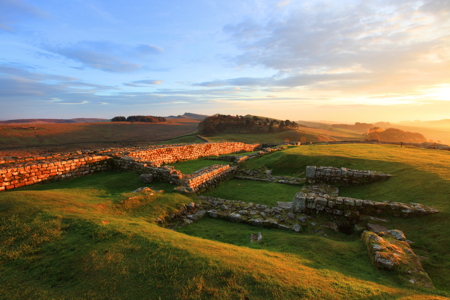Professor Ian Haynes, Professor of Archaeology
History, Classics and Archaeology
Humanities and Social Sciences
What did you do?
Working with talented colleagues we produced Hadrian’s Wall: Life on the Roman Frontier, a 6 week MOOC available on the Future Learn platform.

Who is involved?
This has been a real collaborative venture showcasing some of the excellent resources we have in the University and the productive relationships we have developed with local organisations.
Key University staff involved include:
- Professor Ian Haynes, Professor of Archaeology
- Suzanne Hardy and Nuala Davis, LTDS
- Digital Media Team
- Dr Rob Collins, now Lecturer in Material Culture
- Alex Turner, Research Associate (Archaeology)
How did you do it?
The process of developing an online course does involve a lot of planning and it is really important to bring in the expertise of colleagues from across the University. We worked closely with colleagues in LTDS and the Digital Media Team to produce a course that was effective for online learners.
There were a number of different elements to this including videos, articles, quizzes and discussion opportunities. I wanted to add some hooks that I knew would strongly appeal to complement the sessions, these included a series of CSI-type forensic problem-solving exercises based on some of the more grisly evidence, but also exercises that helped people with no knowledge of Latin gain (justified) confidence that they could even read basic Roman inscriptions. We also wanted to get out into the landscape, so that people got the benefit of the style of on-site teaching we stress so much here at Newcastle. Some of the videos we produced involved aerial shots which were really effective in helping learners gain an understanding of the scale and nature of some of the sites.
We also looked at the campus learning experience for Newcastle students and thought about which elements could be adapted to work in an online course.
As part of one of our degree programmes I run a ‘multi-sensory seminar’ (a themed meal that draws on the idea of a murder mystery dinner party). Students have to work with a brilliantly reconstructed C4 room, with a range of museum quality replicas provided by the University to evoke the atmosphere of life in northern Britain in the Late Roman period. By creating this immersive environment and using visualisation it encourages students to start to ask more questions and to think deeply about the environment that they are learning about. To successfully solve the mystery students need to have a good knowledge of the period and the material.
We brought Dr Rob Collins in to translate this idea into something that could be filmed for the MOOC. Our MA students then played the kind of roles they would play in the dining seminar in short sections. Rob crafted a brilliant MOOC specific scenario based on the so-called ‘Barbarian Conspiracy’ of AD 367. This allowed us to introduce a period of history many found difficult and complex in a novel and engaging way.
If you are interested in seeing other examples of the type of activities that the MOOC included, you can view the course on the FutureLearn site.
Why did you do it?
When MOOCs were in early development there was an idea that they might be successful as feeder courses into full degrees at the University but I did not really think that the course would revolutionise recruitment – though I would note that we have had some splendid students join as a result of it. Rather one of my aims was to show how we contribute to the wider community and how that community contributes to us. So this was a great opportunity to work with local stake-holders, to help raise their profile as well as our own. To be, in short, the civic university we aspire to being.
We have a long history of working with local organisations in the archaeology field and an online course offered a way of bringing people together beyond the walls of the University. The MOOC showcased these excellent working relationships.
We are all also passionate about our subject and a benefit of a MOOC is that it can deliver glimpses of cutting edge research in a shorter period of time to a diverse range of learners.
With Archaeology there is a real benefit to including elements of visual learning. The approach we have taken with the MOOC means that we are able to envelope people in spaces and provide an excellent learning experience.
Student Voice
The MOOC results in over 45,000 pieces of feedback. It is important to reflect on this and you can view some of the student feedback on the FutureLearn site.
Does it work?
I think from the perspective of showcasing Newcastle as an institution engaged across Central Britain, the MOOC has most definitely been successful. It is also successful in getting the Newcastle message further afield. I remember one morning coming in to emails from a student in Iran and another from Brazil, both related to the course; it was a moment that epitomised the reach of the course. The MOOC has now been accessed by students in over 125 nations. It’s hard to think of a better way of having this kind of international impact.
Having the resources from the MOOC has also enriched campus teaching. It was important that the MOOC provided a different experience to that of the students registered on our degree programmes but there are elements that they can benefit from.
One benefit relates to improving students’ general knowledge. Degree students here at Newcastle need to write a good investigative piece as part of their programme. There is a natural tendency for them to focus extensively on this piece of work but we feel it is important to stay aware of the bigger picture, so that all that they do is grounded in a good general understanding of the subject. Short video clips are really useful in allowing students to do this. It also means that students have a mechanism that they can use to enhance their knowledge that they can easily come back to.
I think there will always be a role for what could be considered more traditional forms of teaching on campus, such as the lecture or the seminar. I am a huge believer in them, but this MOOC has reinforced the range of other formats that can contribute to achieving teaching and learning aims.
We all learnt together about the different forms of delivery and realised that ‘every second counts.’ This has made me think about what learning aims can be achieved in 5 minutes, which is often more than you think. Videos can be a way of transforming seminar preparation; give a student a five minute video to watch before a seminar and they go in as an engaged learner which not only benefits them but also their peers.
There have been lots of teaching and learning lessons to come out of the MOOC with granular data about the behaviour of online learners helping us to optimise video length, length of text etc. This has been an ongoing process with FutureLearn learning themselves.
Another success is how the MOOC showcases the talent of colleagues and how colleagues from all areas of the University can come together to produce something of such a high quality. Our wonderful team all continue to be tremendously successful, Suzanne and Nuala are inundated with enquiries, the multiple-capabilities of our digital media team are being requested for ever more diverse and interesting projects, and the excellent Rob Collins has been appointed a full-time lecturer at the University. This MOOC has been used as an example of good practice and shown to Senior Government ministers as an example of what can be achieved with online .
Interested in finding out more about about online learning?
Visit the LTDS website or email ltds@ncl.ac.uk
Contact Details

Professor Ian Haynes, School of History, Classics and Archaeology
